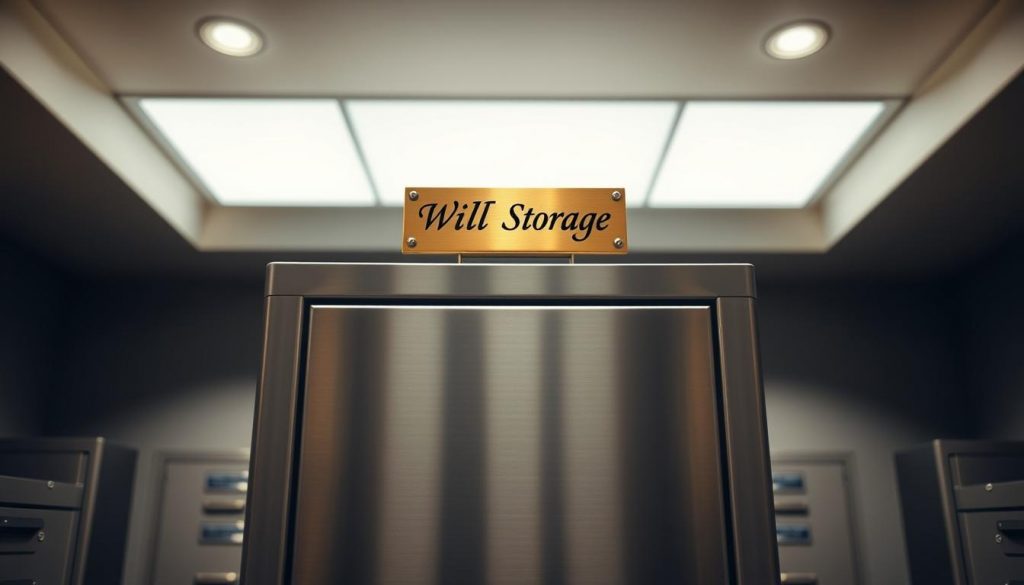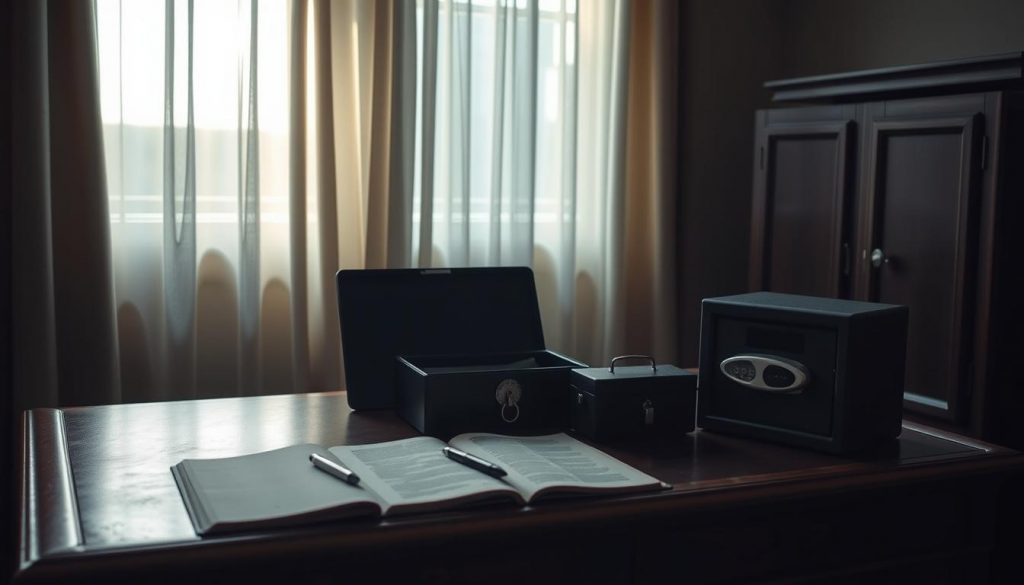Storing your will securely is a crucial final step in the will-making process, ensuring that your wishes are respected and your loved ones are protected.
With several options available in the UK, choosing the right place to store your will can be a daunting task. You can store it with a solicitor, the probate service, or in a home safe. Each option has its pros and cons, which we will explore in this article to help you make an informed decision.
We understand the importance of safeguarding your family’s future. In the following sections, we will guide you through the process, highlighting the benefits and drawbacks of each will storage option.
Key Takeaways
- Storing your will in a secure location is crucial for ensuring it is safe and accessible.
- Options for storing a will include solicitors, the probate service, and home safes.
- Each storage option has its advantages and disadvantages.
- Choosing the right storage option depends on your individual needs and preferences.
- Understanding the pros and cons of each option is essential for making an informed decision.
Understanding the Importance of a Will
Understanding the significance of a will is crucial for ensuring your assets are distributed according to your wishes. A will is a vital document that outlines your intentions regarding your estate after your passing.
A will is more than just a legal document; it’s a way to ensure that your loved ones are taken care of and that your assets are distributed as you see fit. It’s essential to understand the key components of a will to make informed decisions about your estate.
What is a Will?
A will, also known as a last will and testament, is a legal document that declares your wishes regarding the distribution of your assets, properties, and other possessions after your death. It allows you to appoint an executor to manage your estate and ensure that your instructions are carried out.

Key Components of a Will
A valid will typically includes several key components:
- Appointment of an Executor: The person responsible for managing your estate and carrying out your instructions as stated in the will.
- Distribution of Assets: A clear outline of how you want your assets, properties, and possessions to be distributed among your beneficiaries.
- Guardianship: If you have minor children, a will allows you to appoint a guardian to care for them in the event of your passing.
- Funeral Wishes: You can include your preferences for funeral arrangements, though this is not legally binding.
It’s crucial to store your will in a secure location to prevent loss or damage. Storing your will at home may not be the safest option due to risks such as fire, flood, or burglary. Instead, consider alternative secure storage options that protect your will and ensure it is accessible when needed.
By understanding the importance of a will and its key components, you can make informed decisions about your estate and ensure that your wishes are respected.
Storage Options for Your Will
The storage of your will is a vital aspect of estate planning, with various options available to suit different needs and preferences. You can store your will at home in a locked safe, with a solicitor, or with the Probate Service. Each option has its pros and cons, which we will explore to help you decide on the best place to keep your will.
Home Safe
Storing your will at home in a safe or a locked cabinet is a convenient option. It allows you to keep your will private and easily accessible. However, it’s crucial to ensure that the safe or cabinet is fireproof and that someone you trust knows where it is and how to access it.
As security is a top concern, consider the following:
- Ensure the safe is anchored to prevent theft.
- Inform a trusted individual about the safe’s location and combination.
- Keep the safe in a location that is not easily discoverable by potential burglars.
Solicitor’s Office
Storing your will with a solicitor is a popular choice due to the security and confidentiality they offer. Solicitors are experienced in handling sensitive documents and can provide guidance on the storage and retrieval of your will.
“Using a solicitor to store your will can provide peace of mind, knowing that your document is secure and can be easily accessed when needed.”
Online Will Storage Services
Online will storage services offer a modern and convenient way to store your will. These services allow you to upload your will and access it from anywhere, at any time. They often provide additional features such as automatic updates and secure storage.
| Feature | Online Will Storage | Traditional Storage |
|---|---|---|
| Accessibility | Accessible from anywhere | Limited to physical location |
| Security | High-level encryption | Dependent on storage method |
| Updates | Automatic updates available | Manual updates required |
Probate Services
The Probate Service is another option for storing your will, particularly if you’re looking for a secure and official repository. Storing your will with the Probate Service can simplify the process of probate after your passing.

When choosing a storage option for your will, consider factors such as security, accessibility, and the ease of updating your will. By selecting the right storage method, you can ensure that your wishes are carried out smoothly and efficiently.
Pros and Cons of Storing a Will at Home
Storing your will at home can be a viable choice, but it’s essential to weigh the pros and cons. This storage option is convenient and readily accessible, but it also comes with potential risks that need to be considered.
Benefits of Home Storage
One of the primary benefits of storing your will at home is that it is easily accessible to you. You can make changes or retrieve the document whenever necessary without relying on third-party services. Additionally, storing your will at home can be cost-effective, as you may already have a secure location, such as a safe or a locked cabinet, where you can keep important documents.
Some key advantages of home storage include:
- Immediate access to your will whenever you need it.
- No additional costs associated with storage services.
- The ability to personally oversee the security of your will.
Risks Associated with Home Storage
Despite the benefits, there are significant risks associated with storing your will at home. The document could be misplaced, damaged, or destroyed in a fire or other disaster. Moreover, unauthorized individuals may gain access to your will if your home is burgled or if family members are not aware of the document’s location and importance.
Some of the risks include:
- The potential for loss or misplacement.
- Vulnerability to damage from fire, water, or other hazards.
- The risk of unauthorized access.
As noted by a legal expert, “Storing your will at home without proper precautions can lead to complications for your loved ones after you’re gone.” It’s crucial to consider these risks and potentially mitigate them by using a home safe or other secure storage methods.

In conclusion, while storing your will at home offers some benefits, it’s vital to be aware of the potential risks and take steps to minimize them. Ensuring that your will is stored securely and is accessible to the right individuals is paramount.
The Advantages of Using a Solicitor
A solicitor can offer expert guidance and secure storage for your will, providing a comprehensive solution for your estate planning needs.
Expertise in Legal Matters
Solicitors are trained professionals with extensive knowledge of legal matters, including wills and estate planning. By storing your will with a solicitor, you benefit from their expertise in ensuring that your will is legally binding and properly executed. This expertise can help prevent potential disputes or challenges to your will after your passing.
Moreover, solicitors are well-versed in the legal requirements for wills in the UK, ensuring that your document complies with all necessary regulations. This includes understanding the importance of witnessing and the need for your will to be in writing.
Security and Confidentiality
One of the primary concerns when storing a will is ensuring its security and confidentiality. Solicitors’ firms are regulated by the Solicitors Regulation Authority, providing a secure environment for your will. This regulatory oversight ensures that your document is protected from loss, damage, or unauthorized access.
By storing your will with a solicitor, you can have confidence that it will be kept confidential and only accessed by authorized individuals. This is particularly important for sensitive or complex family situations where privacy is paramount.
In conclusion, using a solicitor for will storage offers the dual benefits of legal expertise and secure, confidential storage. This combination provides peace of mind, knowing that your will is both legally sound and safely stored.
Online Will Storage Services Explained
The way we store important documents is changing with online will storage. This modern approach to securing your last will is gaining popularity due to its convenience and security features.
What Are Online Will Storage Services?
Online will storage services are digital platforms that allow you to store your will securely online. These services provide a safe and accessible way to keep your will, ensuring it is protected and can be retrieved when needed. The National Will Safe Document Storage facility is an example of a unique national, central storage facility for wills that overcomes the problems associated with safely caring for important legal documents.

Advantages of Digital Storage
Digital storage for wills offers several advantages, including:
- Enhanced Security: Online storage services use advanced security measures to protect your documents.
- Easy Access: Your will can be accessed from anywhere, at any time, provided you have the necessary credentials.
- Backup and Recovery: Many services offer backup and recovery options, ensuring your will is safe even in case of technical issues.
- Notification Services: Some platforms notify your executors or loved ones when the time comes, making the process smoother.
By storing your will online, you can have peace of mind knowing it is secure and easily accessible to those who need it.
The Role of Probate Services
Probate services play a vital role in the administration of your will after you’ve passed away. They are responsible for ensuring that your estate is distributed according to your wishes as outlined in your will.
When to Contact Probate Services
You can contact probate services when you are ready to deposit your will. In England and Wales, this service is available for a fee of £20. You have the option to deposit your will either in person or by post.
It’s essential to note that probate services are not involved in the storage of your will during your lifetime but come into play after your passing. They will help in obtaining the legal right to administer your estate, a process known as probate.
Benefits of Storing Your Will with Probate
Storing your will with the probate service provides several benefits. Firstly, it ensures that your will is safe and secure. The probate registry is a secure environment, minimizing the risk of your will being lost or damaged.
Key Benefits:
- Secure storage of your will
- Ease of access for executors after your passing
- Audited and regulated environment
As noted by a legal expert, “Using the probate service for will storage can provide peace of mind for both you and your executors, knowing that your will is safely stored and easily accessible when needed.”
“The probate service is a trusted and reliable option for storing your will, ensuring that it is handled with care and professionalism.”
Let’s consider a comparison of will storage options:
| Storage Option | Security | Accessibility | Cost |
|---|---|---|---|
| Home Safe | Variable | Difficult | Free (if you already have a safe) |
| Solicitor’s Office | High | Easy (with prior arrangement) | Variable (dependent on solicitor) |
| Probate Service | High | Easy (after death) | £20 |

In conclusion, probate services offer a secure and reliable way to store your will, ensuring it is handled properly after your passing. By understanding the role of probate services and the benefits they provide, you can make an informed decision about your will storage options.
How to Choose the Right Storage Option
The decision on how to store your will securely is a vital part of the estate planning process. With various storage options available, it’s essential to consider your personal circumstances and the level of security you require.
Factors to Consider
When deciding on the best place to keep your will, several factors come into play. You need to consider the level of security, accessibility, and the potential for damage or loss. Here are some key factors to consider:
- Security: The storage option should provide a high level of security against theft, fire, and other potential risks.
- Accessibility: Ensure that the storage option is accessible to you and your executors when needed.
- Confidentiality: The storage method should maintain the confidentiality of your will.
Let’s examine these factors in a comparative table to help you make an informed decision:
| Storage Option | Security Level | Accessibility | Confidentiality |
|---|---|---|---|
| Home Safe | High | Easy | High |
| Solicitor’s Office | Very High | Moderate | Very High |
| Online Will Storage | Very High | Easy | High |
| Probate Services | High | Moderate | High |
Aligning with Your Personal Circumstances
Your personal circumstances play a significant role in choosing the best storage option for your will. For instance, if you have a home safe, storing your will at home might be convenient. However, if you’re concerned about security or potential damage, a solicitor’s office or online will storage service might be more appropriate.
Consider the following questions to help you decide:
- Do you have a secure location at home, such as a safe?
- How often do you plan to review or update your will?
- Do you prefer a digital or physical copy of your will?
By considering these factors and aligning them with your personal circumstances, you can choose the best place to keep your will, ensuring it is stored securely and remains accessible when needed.
The Legal Requirements for Wills in the UK
Understanding the legal requirements for wills in the UK is crucial for ensuring your will is valid and effective. When creating a will, it’s essential to comply with UK law to avoid any disputes or invalidation.
Essential Legal Elements
For a will to be considered valid in the UK, it must meet certain legal criteria. These include:
- The will must be in writing.
- The testator (the person making the will) must be at least 18 years old and of sound mind.
- The will must be signed by the testator in the presence of two witnesses.
- The two witnesses must also sign the will in the presence of the testator.
As stated by the UK government, “The original versions of legal documents, such as wills, are the only legally binding versions. Scans, photocopies and computer records are not legally valid.” (Store a will with the Probate). This emphasizes the importance of maintaining the original document.
| Legal Requirement | Description |
|---|---|
| In Writing | The will must be documented in writing to be considered valid. |
| Age and Mental Capacity | The testator must be at least 18 years old and of sound mind. |
| Signature and Witnesses | The will must be signed by the testator and two witnesses, all in each other’s presence. |
Witness Requirements
The role of witnesses is critical in validating a will. Witnesses must be impartial and not beneficiaries of the will. This requirement helps prevent conflicts of interest and ensures the testator’s wishes are respected.
Key Considerations for Witnesses:
- Witnesses must be at least 18 years old.
- They must not be beneficiaries or spouses of beneficiaries named in the will.
- Witnesses should sign the will in the presence of the testator and each other.
By understanding and adhering to these legal requirements, you can ensure that your will is valid, effective, and reflects your wishes regarding the distribution of your assets.
Common Mistakes to Avoid
When it comes to storing your will, avoiding common mistakes is crucial for ensuring your wishes are respected. Many individuals make critical errors that can lead to significant complications for their loved ones.
Not Updating Your Will Regularly
Failing to update your will regularly can lead to unintended consequences. Life events such as marriage, divorce, or the birth of a child can significantly impact your wishes regarding the distribution of your estate.
To avoid this mistake, it’s essential to review and update your will periodically. This ensures that your will remains relevant and accurately reflects your current wishes.
| Life Event | Impact on Your Will | Action Required |
|---|---|---|
| Marriage | May automatically revoke a previous will | Update your will to include your new spouse |
| Divorce | May not automatically revoke a will, but can affect provisions for your ex-spouse | Review and update your will to reflect your changed circumstances |
| Birth of a Child | New heir to your estate | Update your will to include provisions for your child |
Failing to Inform Key Individuals
It’s also crucial to inform key individuals about your will and its storage location. Failing to do so can lead to delays and complications when your will needs to be executed.
Ensure that your executors and loved ones know where your will is stored and how to access it. This can help prevent unnecessary stress and complications during an already difficult time.
By avoiding these common mistakes, you can ensure that your will is effective and your wishes are respected. Choosing a secure will storage option and keeping your will up to date are critical steps in the estate planning process.
When selecting a will storage option, consider factors such as security, accessibility, and the ability to update your will as needed. By doing so, you can have peace of mind knowing that your estate is in order and your loved ones will be taken care of according to your wishes.
The Process of Retrieving Your Will
The process of retrieving your will involves several key steps that your executors must follow. When you pass away, your executors will need to access your will to carry out your wishes as stated in the document.
Who Can Access Your Will?
Access to your will is typically restricted to your executors or individuals authorized by you. To retrieve your will, your executors will need to provide the storage service with a death certificate and proof of their identity. This ensures that your will is released to the right people, maintaining the confidentiality and integrity of the document.
As stated by legal professionals, “The executor’s role is to manage the deceased’s estate according to their will, ensuring that their wishes are respected and carried out.” Choosing the right storage option can simplify this process for your executors.
Steps to Take After Your Passing
After your passing, your executors should follow these steps to retrieve your will:
- Notify the storage service or relevant authorities of your passing.
- Provide the required documentation, such as a death certificate.
- Verify their identity as executors of your estate.
- Retrieve your will and begin the probate process if necessary.
By understanding the process of retrieving your will, you can ensure that your executors are prepared to carry out your wishes efficiently. Whether you have chosen to store your will at home or with a will storage service, it’s crucial that your executors know the steps to take.
Conclusion: Making the Right Choice
Choosing the best place to keep your will is a crucial decision that depends on your individual circumstances and priorities. We have explored various storage options, each with its benefits and drawbacks.
Key Considerations
When deciding where to store your will, consider factors such as security, accessibility, and the potential for loss or damage. You must also think about who should have access to your will after your passing.
Storing your will securely is vital to ensure it remains safe and is executed according to your wishes. You can opt for a home safe, a solicitor’s office, online will storage services, or probate services. Each option has its advantages, and the right choice for you will depend on your specific needs.
To make an informed decision, weigh the pros and cons of each storage option carefully. Consider consulting with a legal professional to determine the best place to keep your will. By doing so, you can ensure that your estate is handled according to your wishes, providing peace of mind for you and your loved ones.


